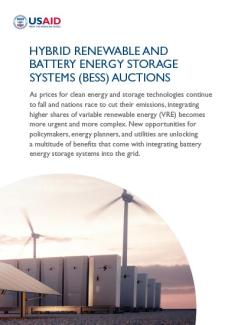Hybrid Renewable & Battery Energy Storage Systems Auctions
New opportunities for policymakers, energy planners, and utilities are unlocking a multitude of benefits that come with integrating battery energy storage systems into the grid.
As prices for clean energy and storage technologies continue to fall and nations race to cut their emissions, integrating higher shares of variable renewable energy (VRE) becomes more urgent and more complex. Many countries find that grid integration concerns become a real barrier to scaling up renewable energy. Policymakers’ objectives often evolve from low power generation costs to enhancing dispatchability, improving the value of renewable energy by delivering renewable energy when and where it is needed, and reducing integration costs.
BESS Barriers and Opportunities
Utility-scale battery energy storage systems (BESS) possesses a unique versatility, offering a wide range of applications across the entire power supply chain. BESS can play a dual role, either as a load or as a generator, and can provide a plethora of services to the grid, such as the ability to shift the timing of variable renewable energy production, capacity and ancillary services, transmission services, and end-use applications. To harness the benefits of this “value stacking” technology, investment plans, government policies, market regulations, and grid codes must be adapted to allow BESS to participate in energy systems by supplying power or providing other services.
The past decade’s downward trend in the levelized cost of battery storage has made BESS increasingly attractive. However, many least-cost energy plans in emerging markets have not acknowledged and taken advantage of BESS. Given the wide range of products BESS can offer and the system-specific requirements, business models for deploying large-scale BESS are still in the nascent stage. Designing electricity products and procurement mechanisms, including auctions, that include BESS and introduce competition while maximizing value creation of BESS assets remains a challenge. Creating a level playing field for BESS requires policies and regulations to adequately address the array of products BESS can offer and remove restrictions that hinder market participation.
Case Studies
Some countries have designed auctions to procure grid-friendly electricity contracts that involve smart combinations of BESS and variable renewable energy.
United States
The state of Hawaii in the United States paired batteries with wind and solar systems to reduce VRE curtailment while meeting its renewable energy goals.
India
Faced with the challenges of electricity transmission congestion and daily production problems, India incorporated BESS into its auction to allow VRE to supply power during peak hours.
Australia
BESS demonstrates its ability to provide frequency control ancillary services when combined with a wind farm.
Colombia
Stand-alone BESS also proves to be beneficial in deferring grid investments, a feature that will be harnessed by Colombia in its long-term expansion plan.
France
A technology-neutral capacity market auction awarded BESS contracts to provide both capacity value and demand response.
Thailand and Brazil
Limited interconnection capacity drives the need for firm or quasi-firm power auctions, which encourage the use of BESS in combination with other technologies, as in Thailand and Brazil where BESS is combined with solar and biofuel generation to firm up energy supply.



